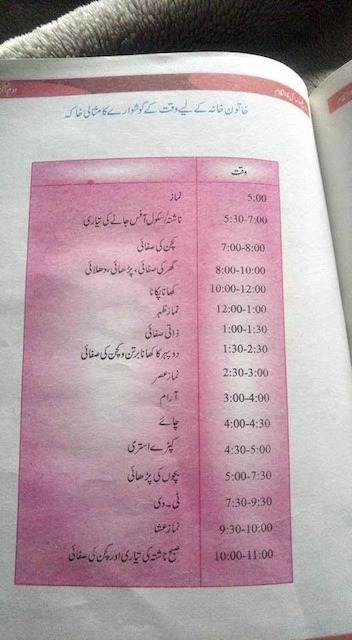
The above image is an excerpt from a middle school textbook of Home Economics for girls in Pakistan.
For those who are not familiar with the Urdu language, I will translate.
(Muslims offer five different prayers in the day. Fajr, Zuhr, Asar and Isha are the names of the four prayers mentioned in this chart.)
An Ideal Example of a Timetable for a Housewife
5:00 a.m.: Fajr Prayer
5:30-7:00 a.m. Prepare breakfast/ Prepare (kids) for school and (husband) for office
7:00-8:00 a.m.: Clean the kitchen
8:00-10:00 a.m.: Cleaning the house, Reading, Laundry
10:00 AM-12:00 p.m.: Cooking
12:00-1:00 p.m.: Zuhr Prayer
1:00-1:30 p.m.: Personal cleaning
1:30-2:30 p.m.: Lunch, Doing the dishes, cleaning the kitchen
2:30-3:00 p.m.: Asar Prayer
3:00-4:00 p.m.: Rest
4:00-4:30 p.m.: Evening tea
4:30-5:00 p.m.: Ironing clothes
5:00-7:30 p.m.: Helping kids with their homework
7:30-9:30 p.m.: TV
9:30-10:00 p.m.: Isha Prayer
10:00-11:00 p.m.: Preparing for tomorrow’s breakfast/Cleaning the kitchen
This is a textbook prepared by the Provincial Curriculum and Textbook Board of the Government, for Home Economics taught solely to girls in sixth, seventh and eighth grades.
Unlike the title, the books do not teach them how to manage their finances successfully in life, but instead teach them how to cook and clean and be perfect housewives. The textbook is usually divided into two sections—the first one is comprised of cooking recipes and the second one teaches how to stitch and knit and other household chores.
When I came across these images on Facebook a few days ago, I was appalled. For a long time now, an easy categorization of the reality of Pakistani women has been impossible. For a few generations, they have been getting educated and holding down jobs, yet they still live with the widespread belief that women don’t actually deserve to have the rights of education and careers.
Women are considered property.
On top of being considered property, there is the absurd and completely unrealistic apotheosizing of women as repositories of honor and holiness to which most honor killings can be traced back. This kind of belief originates from 7th century Arabia where, with the rise of Islam, women were awarded a level of respect that was absent in the Arabs before.
Today, in the twenty-first century, most Islamic teachings have been twisted and marred for the benefit of the misogynist and the patriarch. When the topic of gender equality comes up, most Muslim men will argue that women only deserve rights no more and no less than the ones that were awarded to them in Arabia some 1,200 years ago. They were treated with little to no respect in the pre-Islamic Arabia.
Amongst the Arabs in the pre-Islamic era, there was, to some extent, a common practice of killing their infant daughters. Muhammad, the apostle of Islam, was deeply saddened by this and took a strong stand against it. He taught his followers to love their daughters and to be kind to them. Now, 1,286 years later, most Muslim men are content with merely having given their daughters the right to survive and want no more progress than that in terms of women’s rights.
This brings me to the most popular kind of feminism in Pakistan: Islamic feminism. Islamic feminists seek to recuperate Islam from male analyses by using passages from the Quran to deter institutional misogyny. Women from the middle and upper middle strata of society excitedly participate in this, listening to lectures convened in Urdu where Quranic verses are interpreted and women are taught about the rights that are afforded to them by Islam.
Suffice to say, Islamic feminism only assists in keeping women behind bars; albeit trying to make them more contented inside the aforementioned bars. At the same time, this promotes intolerance for non-Muslim women in the name of promoting solidarity amongst Muslim women.
Secular feminists, on the other hand, seek out gender equality for women irrespective of their social and religious background. While secular feminism links to other feminist movements worldwide, it is also the one most openly cast down and inhibited in Pakistan. In a rigidly patriarchal setup, most men do not want to see women taking charge in any arena of the society. The men conveniently hide behind the version of Islam that they have distorted to suit their own misogynistic needs.
They tell their women that the best place for them is within the household and the only place where they can be respected for sure.
After confining their women to the four walls of the house by constantly telling them about the wolves that roam the world outside, these same men will take a carefree stroll down the street to catcall, jeer and often follow any woman that passes by them. Pakistani men also tend to demonize the western world in terms of the emancipation of women in all walks of life, but especially sexual. They will often go as far as saying with pride that the number of sexual assaults reported in Pakistan is much less compared to those reported in a Western country. This never fails to force me to tears because most of the time in this country, sexual assaults are never reported for fear of the family’s honor being maimed.
I remember a conversation that took place between my educated, supposedly progressive father and me. Several months ago, I wanted to ask my father’s permission to apply for a Masters scholarship to the United States. After much preamble and way too much hesitation, I fearfully asked him if I may apply. He lost all pretense of a supposedly calm and reasonable demeanor and shot back, “Do you want your parents to be hung at the altar? Because that’s the state we will be in as long as you are out of the country, alone.”
To my father, any girl who was on her own and without a guardian in the western world was bound to either succumb to degenerate ways or not be safe at all.
Sadly, that was not the only time being a girl got in the way of my educational and career aspirations. I wanted more than anything to go to one of my favorite grad schools, which was definitely not in Pakistan, but I was not permitted to do that even if I won a full scholarship. However, in the same family, boys are constantly encouraged to apply to good foreign schools even if the family has to pay every last penny for their expenses. From the course material in the textbooks, the blatant sexism of most male teachers and the overall environment of the educational institutions, nothing teaches girls that they are individual human beings with just as many rights as boys.
I attended college at a prestigious university of Pakistan, which has an all-girls campus. The girls who live on campus are only allowed to leave the premises with a signed permission slip from their hostel coordinator, which can only be obtained with the prior permission of one’s parent or guardian, and no more than once a week.
When students who did not live on campus entered the campus premises in the morning, they were not allowed to leave before 1:00 p.m. regardless of whether they finished earlier. If the administration was asked for the reason behind this absurd rule, they would conveniently reply that it was to keep the girls from loitering outside. Like most other educational institutions in the country, the university also made the girls adhere to a strict dress code, to insure the girls did not wear clothes that highlighted their bodies in any way.
And lastly, on the subject of sexuality and relationships, while being in a relationship without being married is not only socially and culturally considered a taboo, it is also against the law. The infamous Hudood Ordinance enacted under the dictatorship of General Zia-ul-Haq in 1977 replaced parts of the British-era Pakistan Penal Code and added new criminal offences of adultery and fornication. This ordinance is still active today and the crimes come with punishments of whipping, amputation, and death by stoning.
While the law does not take away a woman’s right to marry a person of her own choice, in most cases, her family does. Hence, most of the time in Pakistani society, marriage results not only in a lifelong emotional disturbance for a woman, but also repeated marital rape. From a young age, it is drilled into a girl’s head that her most important duty is to tend to her husband’s every need. If the husband cheats then the wife will likely have to live with the socially induced guilt that she did not satisfy him enough physically.
The concept of conjugal rights within marriage is recognized as law in Pakistan, however, there has never been a recorded case of marital rape being successfully prosecuted against legally married couples in Pakistan. This is hard to understand since a recent research study conducted by Lahore University of Management Sciences (LUMS) students amongst women on the subject reported that 96.8 percent of the total respondents said that they had experienced some form of domestic violence by their spouses and 46.9 percent reported non-consensual sex.
So there you have it: we cannot turn to our families. We cannot look towards our educational institutions. And we sure as hell cannot ask our government for help.
With issues like terrorism, poverty and illiteracy that are usually the first ones to come up in reference to Pakistan, I feel like the women of Pakistan keep getting pushed further toward the backdrop.
It is time that women from all around the globe came together for their Pakistani sisters by, first acknowledging the suffering that they have to endure on a day-to-day basis.
Here are some initial steps that women around the world can take to help Muslim women, who are just as deserving as any other women in their rights to education, to marry whom they choose, and to claim their autonomy as a person rather than an object forced to serve at the whims of patriarchy:
- Enable Muslim women to be a voice and help them spread their voices. Non-Muslim women can support the progress which our sisters deserve.
- Be informed of news that is happening every day in terms of violence and subjugation against Pakistani women. And then decide what action we can take whether on an individual or institutional level to help our sisters.
- Offer Support. Stand up for NGOs and NPOs that promote Women’s Rights in Pakistan. Some examples are Gender Reform Action Plan (GRAP), Humanity Healing, Women Aid Trust, and Women’s Rights Association Pakistan.
- Encourage and participate in dialogue and support the ones who are brave enough to raise their voices. An excellent example is Girls at Dhabas, which is a group of exemplary young women struggling to redefine the public space.
- For those inside Pakistan, educate yourselves regarding gender equality since your textbooks and institutions are definitely not going to. And resist, okay? Don’t just become conveniently subservient. Be the voice of reason whenever and however you can. Support your sisters. And above all, be safe. Help keep each other safe. You are destined for great things.
- For those outside Pakistan, let our plight be close to your hearts. We have suffered in silence for ages but now we are calling out against the injustice and the sheer inhumanity. We deserve to be a part of the modern world.
“I am not free while any woman is unfree, even when her shackles are very different from my own.” ~ Audre Lorde
Author: Kanwal Mukhtar
Image: Author’s Own; Victor Camilo/Flickr
Apprentice Editor: Julie Barr; Editor: Catherine Monkman










Read 0 comments and reply